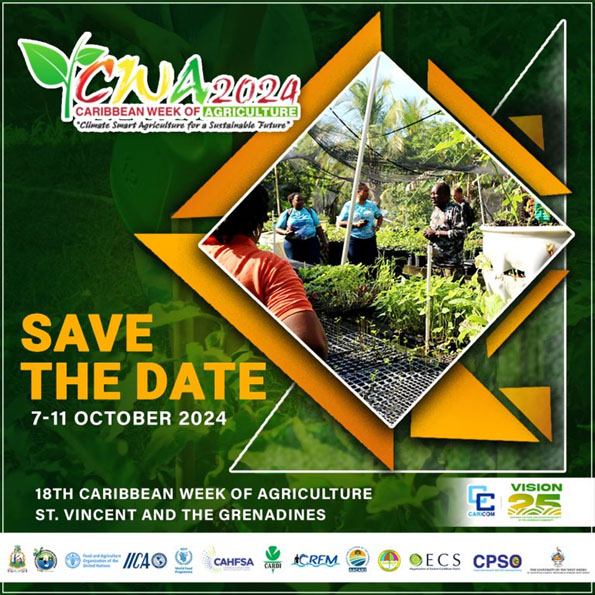It is by no means accidental that the 2024 Caribbean Week of Agriculture event is being staged in, St. Vincent and the Grenadines, a country that not only boasts less than generous agricultural bona fides but is also still recovering from some of the worst excesses of Hurricane Beryl’s recent rampage. One of the more absorbing stories deriving from Beryl’s tirade focuses on one of St. Vincent’s smallest inhabited islands, Mayreau, “a dot on the map,’ according to one story, that “is so small that it’s barely visible.” Chillingly, the story goes on to assert that the impact of the hurricane “nearly erased it (Mayreau) from the map.”
What Beryl has done is to bring the future of the Caribbean, particularly its food security bona fides, into sharp focus. For the region and more particularly for territories like St. Vincent and the Grenadines climate change is, these days not just a weather-related phenomenon but one which could have implications for the food security and even the very survival of significant swathes of the region.
One question that immediately arises has to do with the extent to which Beryl has (or has not) caused the region to consider more seriously the extent to which climate-related issues are likely to weigh more heavily on the state of the region’s food security. The theme for Carib-bean Week of Agriculture this year is ‘Climate Smart Agriculture for a Sustainable Future’ though it is no secret that here in the Caribbean the nexus between eye-catching sloganeering and the actual implementation of those slogans has been, all too frequently, wafer thin.
So that when the delegations the CARICOM member states gather at the Arnos Vale Sporting Complex for seven days – October 7th – 11th the programme of activities will, as a matter of necessity, have to focus on issues that go beyond the decorative parading of local foods and move assertively into the realm of devising strategies to ensure that, as far as we can, as a region, double down on regional food security undertakings and find ways of dodging between the incessant raindrops of climate change to keep the engine of food security running and, if we can, at full throttle. One expects, for example, that whatever the extent of the parading of the products from the various territories there will be serious and structured sit-ins/think-ins that cut to the chase of applying skills and science to coexisting with the excesses of climate change in an effort to keep the region fed.
Arguably, there will probably by no better forum in the immediate future to require of Guyana and Barbados to provide a comprehensive report on just where we are in the matter our regional food security undertaking what had been a highly touted regional food security undertaking launched more than two years ago. that envisioned the creating of elaborate infrastructure to ensure not just that the region produced more than sufficient food to go around but also that all of the various logistical arrangements for ensuring that the various CARICOM countries are positioned to have adequate access to sufficient volumes of nutritious foods. The absence of such an update would rob us of the privilege of honestly declaring that the event would have been a success.
Significantly, CAW 2024 anticipates active participation from both the public and private sectors and here it is apposite to note that the lion’s share of agriculture in the region is private sector-driven. According to information disseminated by the organizers, one of the primary purposes of CAW 2024 is to “have an opportunity to dialogue and forge a common vision for the repositioning of agriculture and the enhancement of rural life.” Here, the problem that we in the Caribbean face is the risk of ‘going overboard’ in pursuit of what we describe as “forging a common vision,” an exercise in which we, as a region, all too frequently lose our way.
St. Vincent and the Grenadines is probably likely to offer representatives of other countries in the region, not least Guyana, an opportunity to get a sense of the havoc unleashed by Hurricane Beryl on some of the more vulnerable territories in the region. That insight, hopefully, will position those countries in the region that have only been minimally impacted by Beryl not just to help shepherd the affected countries through a challenging period but also to cause the region to act together to build a more robust base against the threat for the challenges which climate change will pose to food security in the period ahead. This, arguably, is their more important mission.








